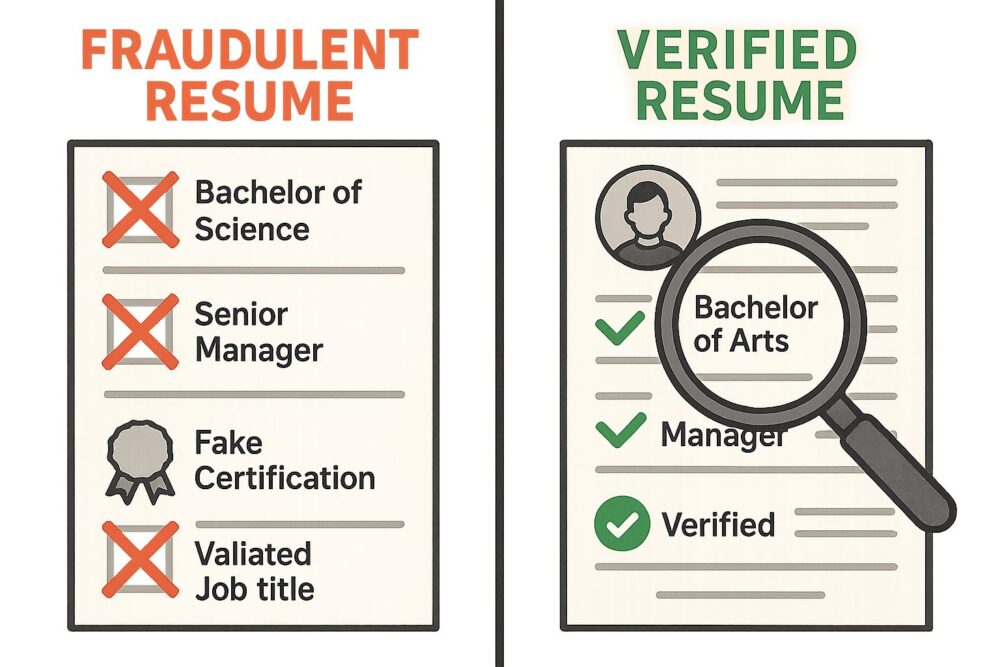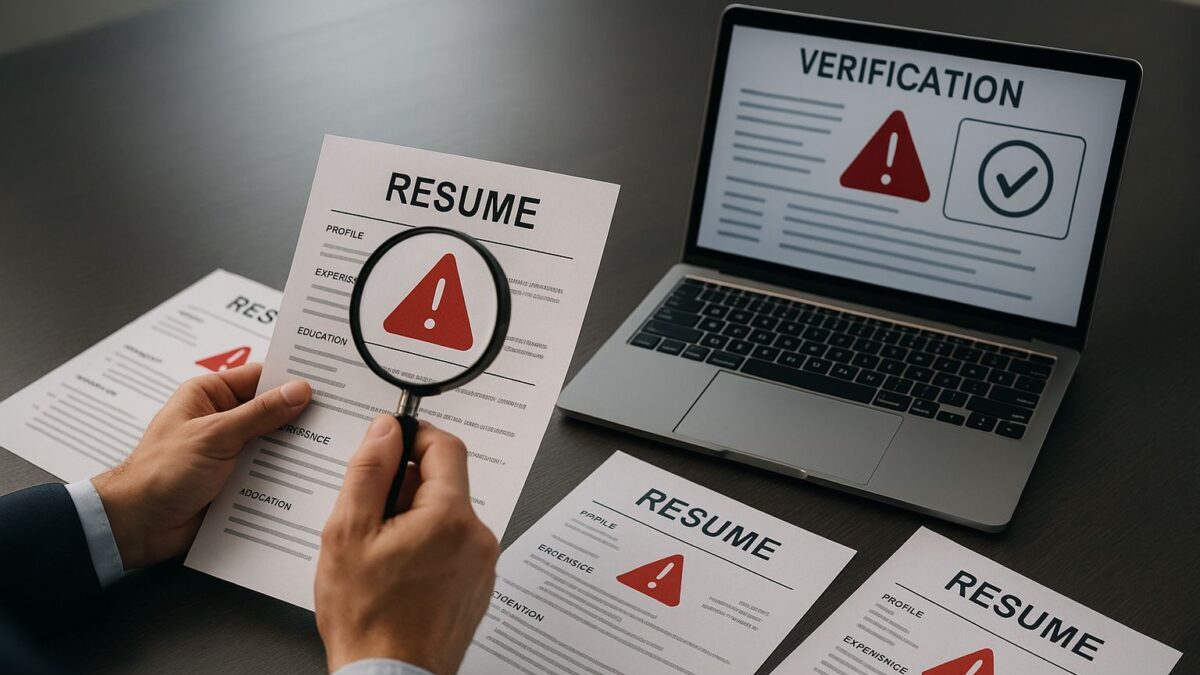Resume Fraud Detection: Resume fraud has reached epidemic proportions in today’s competitive job market, with studies indicating that up to 85% of resumes contain some form of misrepresentation or outright falsification. Effective resume fraud detection has become essential for organizations seeking to protect their hiring processes, maintain workplace integrity, and avoid the costly consequences of hiring unqualified candidates.
The sophistication of resume fraud continues evolving, with candidates using advanced techniques including fake references, purchased credentials, and AI-generated work histories that can fool even experienced recruiters. Understanding how to identify these deceptions protects organizations from legal liability, financial loss, and reputational damage associated with fraudulent hires.
Modern resume fraud detection requires systematic approaches that combine technology solutions with human expertise to verify candidate credentials, work experience, and qualifications before making hiring decisions. The investment in comprehensive verification processes pays dividends through improved hire quality and reduced turnover.
Resume Fraud Detection: Common Types of Resume Fraud

Educational Credential Falsification
Fraud detection resume: Educational fraud represents one of the most prevalent forms of resume deception, ranging from claiming degrees never earned to inflating academic achievements and fabricating entire educational histories. Resume fraud detection in this area requires verification through official institutional channels and credential authentication services.
Degree mills and fake universities have proliferated online, creating sophisticated websites and documentation that can appear legitimate to casual inspection. These operations specifically target resume enhancement, providing fraudulent degrees and certifications that require specialized knowledge to identify.
Grade point average inflation and honor society claims are common forms of educational misrepresentation that may seem minor but indicate broader integrity issues. Effective resume fraud detection processes verify not just degree completion but academic performance claims and extracurricular achievements.
Professional certification fraud involves claiming credentials from legitimate organizations without actually completing required training or examinations. These false claims can be particularly dangerous in regulated industries where specific certifications ensure public safety and professional competence.
Employment History Manipulation
Work experience fabrication ranges from inflating job titles and responsibilities to creating entirely fictional employment histories with fake companies and references. Modern resume fraud detection must verify not only employment dates but actual job functions and achievements claimed by candidates.
Salary inflation and promotion timeline manipulation create false impressions of career progression and market value. Candidates may claim senior positions held for brief periods or inflate compensation to justify higher salary expectations in new roles.
Reference fraud involves providing contact information for friends or family members posing as former supervisors or colleagues. Sophisticated candidates may create elaborate schemes with multiple accomplices to support false employment claims during reference checking.
Company closure exploitation occurs when candidates fabricate roles at companies that have gone out of business, making verification more challenging. Resume fraud detection protocols must include strategies for verifying employment at defunct organizations through alternative documentation sources.
Skills and Achievement Exaggeration
Technical skill misrepresentation has become increasingly sophisticated as candidates claim expertise in popular technologies, programming languages, or software platforms without actual proficiency. Resume fraud detection in technical roles requires practical skill assessment beyond written claims.
Language proficiency fraud involves claiming fluency in languages essential for specific roles without actual communication ability. This deception can have serious consequences in positions requiring multilingual communication or international business interaction.
Achievement inflation includes exaggerating project outcomes, team sizes managed, or business impact generated in previous roles. Effective resume fraud detection verifies specific accomplishments through reference checks and documentation review.
Award and recognition fabrication involves claiming professional honors, industry recognition, or academic achievements that can be particularly difficult to verify without specialized knowledge of relevant organizations and programs.
Advanced Detection Strategies and Technologies
Automated Verification Systems
AI-powered resume fraud detection systems can analyze patterns, inconsistencies, and red flags that might escape human review. These technologies cross-reference information across multiple databases and identify anomalies requiring further investigation.
Database integration enables real-time verification of educational institutions, professional licenses, and employment records through official sources. Advanced systems can flag suspicious patterns such as employment gaps, unusual career progressions, or geographic inconsistencies.
Social media analysis tools examine candidates’ online presence for consistency with resume claims, identifying discrepancies between professional achievements and digital footprints that may indicate deception.
Blockchain verification systems are emerging as solutions for credential authentication, creating tamper-proof records that prevent educational and certification fraud while streamlining verification processes.
Human-Centered Verification Methods
Behavioral interviewing techniques specifically designed for resume fraud detection focus on obtaining detailed information about claimed experiences, achievements, and qualifications that can reveal inconsistencies or knowledge gaps.
Technical competency assessments provide objective measures of skills claimed on resumes, identifying candidates who lack proficiency in areas essential for role success. These evaluations should be designed to test practical application rather than theoretical knowledge.
Reference verification protocols that go beyond basic employment confirmation include structured interviews with former supervisors, colleagues, and subordinates to verify specific achievements and work quality claims.
Background investigation services provide comprehensive verification including education, employment, criminal history, and professional license validation through official channels and specialized investigation techniques.
Industry-Specific Considerations
Healthcare and Medical Professionals
Medical credential verification requires specialized resume fraud detection approaches due to the critical nature of healthcare roles and complex licensing requirements. False medical credentials can endanger patient safety and expose organizations to significant liability.
Board certification verification, medical school authentication, and residency program confirmation require direct contact with medical institutions and licensing boards. Many healthcare organizations employ specialized credentialing services for comprehensive verification.
Malpractice history and disciplinary action verification protects healthcare organizations from hiring professionals with undisclosed performance or ethical issues that could impact patient care and organizational reputation.
Financial Services and Banking
Financial industry resume fraud detection must address regulatory compliance requirements and fiduciary responsibilities that make credential verification particularly critical. False qualifications in financial roles can lead to regulatory violations and substantial penalties.
Securities license verification, professional certification authentication, and regulatory violation screening require specialized knowledge of financial industry requirements and access to industry-specific databases.
Credit and background checks for financial roles often exceed standard employment verification due to positions involving money handling, client asset management, and regulatory oversight responsibilities.
Technology and Engineering
Technical skill verification in technology roles requires practical assessment methods that go beyond resume claims. Resume fraud detection in this sector often involves coding challenges, system design exercises, and technical interviews that reveal actual competency levels.
Security clearance verification for technology roles in government or defense contractors requires specialized background investigation procedures that exceed standard employment verification processes.
Open source contribution verification examines candidates’ actual code contributions, project involvement, and technical community participation that can validate or contradict resume claims about technical expertise and experience.
Building Effective Verification Processes
Systematic Verification Protocols
Comprehensive resume fraud detection requires standardized processes that ensure consistent verification across all candidates and positions. These protocols should include mandatory verification elements and escalation procedures for suspicious findings.
Risk-based verification adjusts investigation depth based on position sensitivity, access levels, and potential impact of fraudulent hires. Senior roles and positions with fiduciary responsibilities warrant more extensive verification efforts.
Timeline management ensures verification activities don’t unnecessarily delay hiring processes while maintaining thoroughness necessary for fraud detection. Efficient processes balance speed with accuracy through parallel verification activities.
Legal and Compliance Considerations
Privacy law compliance ensures verification activities respect candidate rights while obtaining necessary information for informed hiring decisions. Organizations must balance fraud detection needs with legal requirements regarding background investigations.
Documentation requirements for verification activities protect organizations from legal challenges while creating records that support hiring decisions. Proper documentation also enables pattern recognition for improving fraud detection processes.
Candidate notification procedures ensure transparency about verification activities while maintaining investigation effectiveness. Clear communication about verification processes can also deter fraudulent applications.
Technology Solutions and Future Trends
Emerging Verification Technologies
Artificial intelligence and machine learning systems continue advancing resume fraud detection capabilities through pattern recognition, anomaly detection, and automated cross-referencing that improves accuracy while reducing manual effort.
Blockchain credential verification systems promise to eliminate many forms of educational and certification fraud by creating tamper-proof digital credentials that can be instantly verified by employers.
Biometric verification technologies may eventually enable identity confirmation that prevents candidates from assuming false identities or using others’ credentials during the application process.
Integration with Hiring Platforms
Applicant tracking system integration enables seamless verification workflows that automatically flag potential fraud indicators and track verification status throughout the hiring process.
Third-party verification service integration streamlines background checks, education verification, and reference validation through automated processes that reduce administrative burden while improving accuracy.
The evolution of resume fraud detection continues as both fraudulent techniques and verification technologies become more sophisticated. Organizations that invest in comprehensive verification processes protect themselves from the significant costs and risks associated with fraudulent hires while building reputations for hiring integrity that attract honest, qualified candidates.

